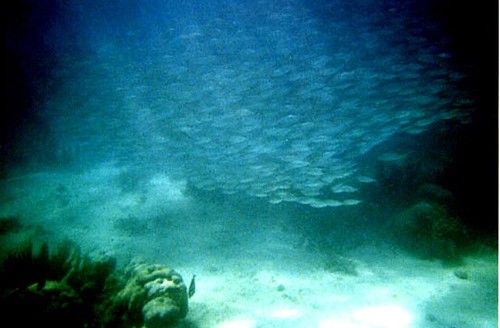
In the beginning were the howlers. The opening line to Barbara Kingsolver’s The Lacuna refers to the monkeys on Isla Pixol off the coast of Mexico. Later the term comes to symbolize any group whose actual or metaphorical howling is meant to terrify or intimidate.

Image courtesy: siwild
Another image from the beginning is a school of fish witnessed by the protagonist, Harrison Shepherd, through a borrowed pair of goggles. He knows that if a shark were to arrive the fish would dart away as a unified body, leaving him for shark-bait. Again, this image resonates throughout the book.

Image Courtesy: dchrisoh
The writing in this book makes me want to weep. Key images resurface throughout, woven through the story and its themes like beautiful strings of bright silk. If you’ve ever pondered what it means to “show” and not “tell”, the opening chapters of The Lacuna will set you straight.
The title, if you’re curious, is not a Spanish word, but refers to an underground tunnel full of water that, when the tides are favorable, “swallow the boy down it’s gullet” and deposits him in a jungle populated by ruins, strange birds, snakes, and bones. This passage does double duty as a metaphor for birth and death. It makes you want to take a trip to Mexico to see if such a magical passage exists, and if so, can you try it?

Image courtesy: Chris Diwald
The theme of this character being dragged about by forces beyond his control is played out many times as he moves from kitchen apprentice to plaster mixer for the artist Diego Rivera and then to cook and secretary for a household including the painter Frida Kahlo and the exiled Russian Marxist revolutionary, Leon Trotsky.
After Trotsky’s assassination, Harrison returns to the U.S. to settle in Asheville, N.C. There he achieves a level of fame to rival that of his former employees as a successful novelist.
Unfortunately for Shepherd, his past association with communists signals his doom in the McCarthy era. I love Shepherd’s conversation with his lawyer. The lawyer points out that the politicians don’t know (or really care) what communism is. They stand for anticommunism above all else (including common sense). Trying to view the two sides as liking tuna fish vs. not liking tuna fish is dangerous. The lawyer says it's actually tuna fish vs. Spanish influenza.
Shepherd ends up on trial for un-American activities and treason. What happens makes you want to punch through time and scream at the unfairness of it all—pure writing genius on Kingsolver’s part. But don’t fear, the unexpected ending is not without hope.
What authors have taken your breath away with their writing prowess?





